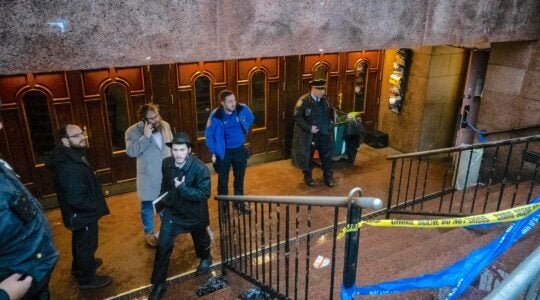If more than 34,000 Palestinians and 440 rockets and 10 suicide bombers were headed in your direction, would you want to know about it?
The United States issued a travel warning regarding Israelís rise in terrorist activity, as well as a rise in organized crime, just a few weeks before a suicide bomber killed nine and wounded more than 50 in Tel Aviv on April 17. But the Conference of President of Major American Jewish Organizations argued that the warning distorts the fact that Israel is safer this year than last.On the Sunday morning before Passover, Col. Moshe Yegev told Galei Tzahal Radio (April 9) that in recent months more than 440 rockets have been fired from Gaza into Israelís western Negev communities, particularly Sderot.Arutz Sheva noted that that there had been 75 terror warnings on the first four days of Passover, up from 55 in all of February, with 10 suicide bombings thwarted so far in 2006.Dropping a match into these oily rags, Israel announced, just days before the bombing, that it was allowing 34,000 Palestinians into Israel ìto facilitate the observance of the upcoming Christian holidays.î But according to Palestinian newspapers, Web sites and Al-Jazeera, the most observed Palestinian holiday in April wasnít Easter but Palestinian Prisoner Day, a major commemoration since 1974, with rallies, arts festivals and sometimes a bombing. The Tel Aviv bomber, Samer Hamad, himself said in his video farewell that the killing was ìas a present to the Palestinian prisoners on the Palestine Prisoner Day.î
Yet no major newspapers mentioned Prisoner Day, or Israelís easing restrictions on 34,000 Palestinians. On the contrary, The New York Times reported on the day of the bombing, ìIsraeli security forces have barred Palestinians from entering Israel since March 11,î with no mention of the Easter gesture at all.Considering the Palestiniansí democratic choice of a Hamas government, Daniel Pipes, director of the Middle East Forum and columnist for The New York Sun and Jerusalem Post, told The Jewish Week via e-mail, ìthe rationale for permitting 34,000 West Bank Palestinians into Israel escapes me.î
But Israelís holiday gesture was considered so commonplace by Israelis that Arye Mekel, Israelís consul-general in New York, told The Jewish Week that he wasnít aware of it, even if it was posted on the official IDF and foreign ministry Web sites.
Prior to the Tel Aviv bombing, the Conference of Presidents sent a complaint about the travel warning to the State Department, pointing out that suicide bombings ìdecreased by more then 50 percent last yearî with ìa sharp overall decrease in terror related incidents. … We find this warning to be excessive and question the appropriateness of the reference to organized criminal activities.î
Even after the bombing, the Conferenceís executive vice chair, Malcolm Hoenlein, told The Jewish Week that his objection still holds, the decline in bombings has been steep and ìtourists have not been hurt,î prior to April 17.The American most seriously wounded in Tel Aviv, Daniel Wultz, had come to Israel with his parents to visit relatives on Passover.Should there be a warning for tourists visiting family in Sderot, target of 440 rockets?ìThatís Sderot,î said Hoenlein, ìbut if you go to Harlem in the middle of the night youíre also putting yourself at risk. Weíre talking about where tourists normally go.î
As for crime, ìyou have more organized crime victims in Russia in a day than Israel has in a year,î said Hoenlein.nIn the weeks before the bombing there were two major pieces, in The New York Times and The Atlantic Monthly, examining the status of Israelís West Bank checkpoints, concluding that these checkpoints are a ìhumiliatingî hardship on Palestinians, and eating away at Israelís soul.
The Times observed that Palestinians would ìseetheî on slow-moving lines. The war against Israel was proving to be hell on a Palestinianís commute into Israel, with the Times pointing out that it could take, for some, as much as four hours, most of it waiting.
In The Atlantic (March), Ted Conover described checkpoints as a ìtemporary imprisonment,î adding, ìI felt as though Iíd been paroledî after one experience.
Conover acknowledged that checkpoints are needed for security but ìthe arbitrariness of checkpoint enforcement makes life miserable for Palestinians. For them, checkpoints have become not just bureaucratic irritants but emblems of Israeli arrogance. He finds a pregnant woman who is made to wait ìin the broiling sun,î and an ìold womanî who had to ìhobble up the road.î He portrays IDF soldiers as uncertain, quoting one soldier, ìyou donít know whoís right and whoís wrong,î the real daily fight ìis fighting for a soul.îYet, in that same Atlantic, some 20 pages later, an article by Kenneth M. Pollack suggests that the United States can win in Iraq if it understands that a principal rule in defeating an insurgency ìis to provide basic safety,î and one way to stop ìthe guerillas and other forces of chaosî is, well, ìcheckpoints.
IDF Maj.-Gen. Elazar Stern recently was quoted in Yediot Achronot: ìThese soldiers are not immoral but exactly the opposite Ö including those who take a girl out of her home in a house in Nablus in the middle of the night in order to find an arms cache. Those same soldiers deal with difficult dilemmas, sorrowful dilemmas.îOn a trip to the United States, he said, ìThey told me at the airport to stand with my hands to the sides, to spread my legs in front of everyone, and even told me to remove my skullcap. Why? Because a few years ago, a few planes hit the Twin Towers and the Pentagon and killed 3,000 peopleÖ [If] we donít put checkpoints in Kalandiya, or in every other place, within two days we will be at the funeral of a friend.î n
The New York Jewish Week brings you the stories behind the headlines, keeping you connected to Jewish life in New York. Help sustain the reporting you trust by donating today.




